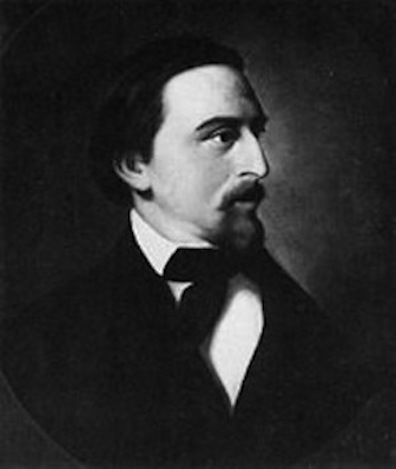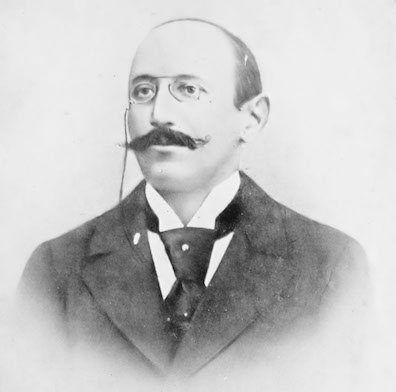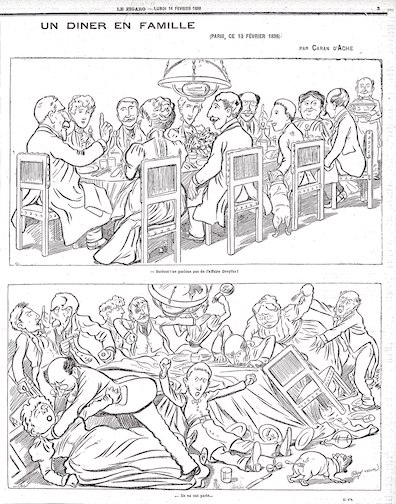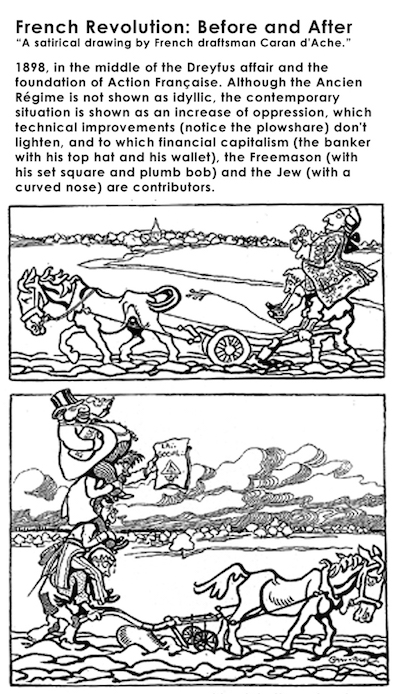"I don't want to see my country fall into the hands of German
jews either. That's our national problem, I'm afraid, just
now": Haines justifies his name
in Telemachus by spouting the theory of an
international Jewish conspiracy. Near the end of Nestor,
the proudly Unionist Mr. Deasy subjects Stephen to more of the
same: "England is in the hands of the jews. In all the highest
places: her finance, her press. And they are the signs of a
nation's decay. Wherever they gather they eat up the nation's
vital strength." Distrust of Jews has deep
historical roots in Europe, but in the late 19th and
early 20th centuries the new ideology of antisemitism was
filling people in Germany, France, Russia, Austria, Hungary,
and Britain with a very specific dread: that their nations
(both Haines and Deasy are fixated on that word, and the
fixation returns in Proteus, Cyclops, and Circe)
were being undermined by disloyal Jewish citizens.
In 1879 Wilhelm Marr (1819-1904) published a pamphlet which
Jacob Katz has called, in From Prejudice to Destruction:
Anti-Semitism, 1700-1933 (1980), the "first
anti-Semitic best-seller." The work was titled Der Weg
zum Siege des Germanenthums über das Judenthum (The
Way to Victory of Germanism over Judaism). The essence
of Marr's argument, Gifford observes, was that "Jews in
Germany had already taken over the press, they had become
'dictators of the financial system,' and they were on the
verge of taking over the legislature and the judiciary." Marr
did not invent these charges: they were already current in the
turbulent, disunified Germany of his day. Nor was he a racial
bigot in any simple sense: three of his four marriages were to
women who were at least partly Jewish, and he renounced
antisemitism and German nationalism toward the end of his
life. But by depicting two peoples (one native, the other a
foreign invader) locked in irreconcilable struggle, and by
describing a massive conspiracy to infiltrate and take over
the vital systems of one society, he provided an ideological
justification for bigotry.
A quarter century later, in 1905, Russian secret police
seeking to justify pogroms in the Pale of Settlement produced
the notorious forgery called the Protocols of the Elders
of Zion, which gave evidence that Jews were planning a
takeover of the entire civilized world. The Protocols
did not circulate in western Europe until the end of the Great
War, but Joyce anachronistically alludes to them in Circe
when Bloom's father "appears garbed in the long
caftan of an elder in Zion." A less anachronistic
inspiration for Haines's reference to "our national problem,"
and for Deasy's picture of Jews so dominating England's "finance,
her press" that they "eat up the nation's vital
strength," may have announced itself to the writer in
1905, when the British Parliament passed the Aliens Act. This
legislation, the first to impose controls on immigration into
the UK, appears to have been aimed particularly at the
multitudes of Jews who were fleeing Russian pogroms. Large
waves of Jewish immigration into England in the 1890s spurred
passage of the law.
A comparably notorious expression of antisemitism had roiled
France in the 1890s when Captain Alfred Dreyfus, a Jew serving
in the French army, was convicted in 1894 on exceedingly
flimsy grounds of giving secret military documents to the
Germans. Many Frenchmen assumed that Jews felt more loyal to
their own international ethnic cabal than to the nation that
had given them citizenship. When new evidence emerged in 1896
implicating a different officer, the military command
suppressed the evidence, effected a hasty acquittal of the
non-Jewish officer, and brought new charges against Dreyfus
based on fabricated documents. Émile Zola published a
fiery letter titled J'accuse in a prominent
newspaper, stirring public pressure for Dreyfus to be
acquitted in a new trial. When the trial was held in 1899, a
battle for public opinion raged, led on the anti-Dreyfus side
by Édouard Drumont, publisher of an antisemitic newspaper
called La Libre Parole that had been slandering Jews
since 1892.
This reactionary response to the Dreyfus trials briefly
surfaces in Proteus when Stephen recalls Kevin Egan
talking about "Monsieur Drumont." No mention is made of
Drumont's views, but by dropping the name into the chapter
Joyce imports a French context for European antisemitism into
this novel. Haines, who has voiced suspicion of "German
Jews" in the previous chapter and whose name means
hate in French, probably represents another indirect
evocation of the Dreyfus affair, in which French bigots
defended their nation from a traitor who was ostensibly
working for the Germans. (Dreyfus was convicted once again in
the 1899 trial, but subsequently pardoned. In 1906, after
years of tireless labor by his brother and his wife, the
falsity of the charges against him was at last proved. He was
reinstated in the French army at the rank of major, and after
serving throughout the Great War retired as a lieutenant
colonel.)
When Haines voices antisemitic views in the first chapter, it
may seem that Joyce is characterizing them as a new import
from England, a parasite clinging to a "stranger." Deasy's more
detailed exposition of the ideology in the second chapter puts
an end to that slight comfort. Antisemitism is already well
established in Ireland and will surface many more times in the
book. The men in the funeral carriage in Hades,
Nosey Flynn in Lestrygonians, Buck Mulligan in Scylla
and Charybdis, Lenehan in Wandering Rocks,
and Bloom himself in Ithaca all indulge invidious
stereotypes about Jews, but it falls to the novel's
outstanding antisemite, the Citizen, to voice the suspicion
that Jews feel no loyalty to the nations that admit them,
unless perchance that country is "the new Jerusalem." The
Citizen insinuates that the many Jews trekking across European
borders are internationalist provocateurs: "What is your
nation, if I may ask?" Bloom, of course, answers that
his nation is Ireland: "I was born here. Ireland."
Antisemitism was certainly the strongest current in fin
de siècle suspicions that internationalist provocateurs
were undermining European nations, but other kinds of bigotry
played a part. Catholic countries like France and Ireland
regarded the international order of Freemasons, whose members
were mostly Protestant and whose beliefs inhabited a hazy
middle ground between religious mystery and secularism, as
threats more pernicious than any form of atheism. In a
personal communication, Vincent Van Wyk points out that Jews
were sometimes associated with Freemasonry, as in the second
cartoon featured here. Joyce happily added this second locus
of suspicion to his protagonist, making Bloom not only (ambiguously)
a Jew but also (far less ambiguously) a Mason. When Nosey
Flynn says that Bloom will never sign his name ("Nothing in black and white"),
he may be trotting out a stereotype about Jews, Freemasons, or
both groups.



